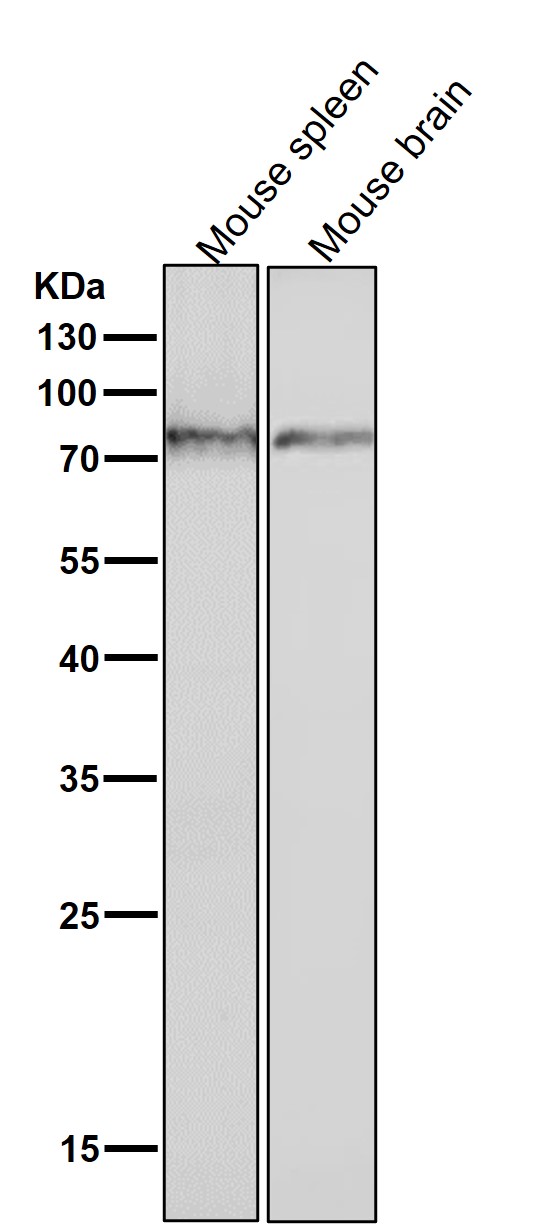
| WB | 1/1000-1/2000 | Human,Mouse,Rat |
| IF | 咨询技术 | Human,Mouse,Rat |
| IHC | 咨询技术 | Human,Mouse,Rat |
| ICC | 技术咨询 | Human,Mouse,Rat |
| FCM | 咨询技术 | Human,Mouse,Rat |
| Elisa | 咨询技术 | Human,Mouse,Rat |
| Aliases | PKC alpha; PKC beta; PKC delta; PKC epsilon; PKC gamma; PKC zeta; PKC2; PKCA; PKCB; PKCD; PKCE; PKCG; PRKCA; PRKCB; PRKCD; PRKCE; PRKCG; PRKCZ;;p-PKC epsilon (S729) |
| WB Predicted band size | 84 kDa |
| Host/Isotype | Rabbit IgG |
| Antibody Type | Primary antibody |
| Storage | Store at 4°C short term. Aliquot and store at -20°C long term. Avoid freeze/thaw cycles. |
| Species Reactivity | Human,Rat |
| Immunogen | A synthesized peptide derived from human PKC epsilon around the phosphorylation site of S729 |
| Formulation | Purified antibody in PBS with 0.05% sodium azide,0.05% BSA and 50% glycerol. |
+ +
以下是3篇涉及Phospho-PKC(S729)抗体的参考文献摘要归纳(注:S729磷酸化位点主要存在于PKCδ亚型中,实际文献中可能标注为PKCδ-S729):
1. **文献名称**:Protein kinase Cδ regulates antigen receptor-induced lytic granule polarization in mouse CD8+ cytotoxic T lymphocytes
**作者**:Liu X et al.
**摘要**:该研究使用Phospho-PKCδ(S729)抗体证实T细胞受体激活后,PKCδ在S729位点的磷酸化促进细胞毒性T淋巴细胞中溶酶体相关颗粒的极化和杀伤功能,揭示了PKCδ在免疫应答中的调控机制。
2. **文献名称**:Phosphorylation of PKCδ at distinct regulatory sites controls mitochondrial membrane depolarization and eryptosis
**作者**:Bianchi G et al.
**摘要**:通过Phospho-PKCδ(S729)抗体检测发现,红细胞程序性死亡(eryptosis)过程中,氧化应激诱导的PKCδ S729磷酸化通过激活下游ASK1-p38信号通路,导致线粒体膜电位崩溃和细胞凋亡。
3. **文献名称**:Site-specific phosphorylation of protein kinase Cδ regulates its catalytic activity
**作者**:Steinberg SF et al.
**摘要**:该研究结合Phospho-PKCδ(S729)抗体与点突变技术,证明S729位点的自磷酸化通过改变PKCδ激酶结构域的构象,增强其对底物(如MARCKS蛋白)的催化活性,揭示了PKCδ活性调控的结构基础。
注:PKC不同亚型的磷酸化位点命名存在差异,部分文献可能采用其他编号系统(如PKCδ的S643对应小鼠S729)。具体实验需结合抗体说明书和物种来源验证。
Phospho-PKC(S729) antibodies are specialized tools used to detect the phosphorylation status of protein kinase C (PKC) at serine residue 729. a critical post-translational modification associated with PKC activation and function. PKC is a family of serine/threonine kinases involved in diverse cellular processes, including proliferation, differentiation, apoptosis, and immune responses. Phosphorylation at specific residues, such as S729 in certain PKC isoforms (e.g., PKCδ), is essential for their full enzymatic activity and stability. This phosphorylation event typically occurs in the catalytic domain and is mediated either by autophosphorylation or upstream kinases, serving as a regulatory mechanism to control PKC signaling.
Antibodies targeting phospho-PKC(S729) are widely used in research to study PKC activation dynamics in response to stimuli like growth factors, hormones, or stressors. They enable the detection of activated PKC in techniques such as Western blotting, immunofluorescence, or immunohistochemistry. These antibodies are particularly valuable in investigating pathological conditions linked to dysregulated PKC signaling, including cancer, neurodegenerative diseases, and cardiovascular disorders. However, specificity validation is crucial, as cross-reactivity with other phosphorylated PKC isoforms or unrelated proteins may occur. Researchers rely on these antibodies to elucidate PKC-related signaling pathways and evaluate therapeutic targets modulating PKC activity.
×